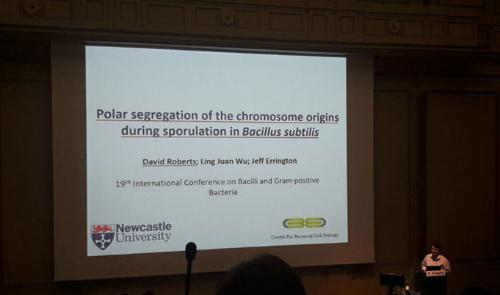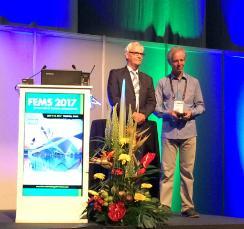News and events
Fernando speaks at Young Microbiologists conference
Posted 6 September 2017
Fernando Santos Beneit has been selected to give a talk at the Young Microbiologists Symposium 2017 run by the Molecular Microbiology departmentof the John Innes Centre in Norwich.
The aim of this event is for the John Innes Centre to hear state-of-the-art presentations in bacterial microbiology, to enhance their understanding of where exciting new developments in the field are heading and to help shape their ideas about future research areas that could be developed within the Department. The intention is to invite young post-docs or outstanding PhD students working on any exciting aspect of bacterial microbiology to give 30 minute talks.
The title of Fernando's talk is: Branching: a ftsZ-independent mechanism of cell division in Streptomyces
It's conference season!
Posted 31 July 2017
Errington lab members have been making the most of the conferences on offer this year:
Kaveh, Berni and Fernando went to ISBA18 in South Korea. Fernando presented a poster entitled Mechanism of FtsZ-independent proliferation in Streptomyces.
David gave a talk at the 19th International conference on bacilli and Gram positive bacteria in Berlin entitled Polar segregation of the chromosome origins during sporulation in Bacillus subtilis.

Clare went to the GRC Chromosome Dynamics conference in Il Ciocco, Italy and presented a poster on Sister chromosome cohesion in the replication terminus region during sporulation of Bacillus subtilis.
Agata attended the RNA2017 conference in Prague and the EMBL New Approaches and Concepts in Microbiology in Heidelberg.
Jeff, Kasia and David went to FEMS 2017 in Valencia, Spain to see Jeff give a prize lecture and be awarded the Lwoff Medal.
Clare wins the people's choice in the 3 Minute Thesis competition
Posted 1 August 2017
Errington lab PhD student, Clare Willis has won the People's Choice prize in the final of Newcastle university's 3 Minute Thesis competition.
Clare's research investigates the organisation and segregation of the chromosome during spore formation in Bacillus subtilis. Studying this will advance knowledge of chromosome dynamics and how the interplay of proteins with DNA is crucial for the timings and control of sporulation initiation.
The Three Minute Thesis (3MT) competition asks doctoral students to explain their research in just three minutes using only one slide. The explanation should be easily understood by a non-specialist. Originally developed by the University of Queensland, Australia it has been taken up by Universities across the world. The competition offers training then the opportunity to compete in a University final in front of the public. The winner will then go forward to compete in the national competition.
6th Baddiley Lecture 4 July 2017 - listen now
Posted 1 August 2017
Professor Dame Carol Robinson gave the 6th Baddiley Lecture on 4 July 2017.
The title was Membrane proteins - the lipid connection. Carol Robinson holds the Chair of Doctor Lee’s Professor of Chemistry at the University of Oxford.
The Baddiley Lecture is a prestigious biennial event organised by the Institute of Cell and Molecular Bisciences. The series was set up in recognition of Professor Sir James Baddiley’s major contribution to Newcastle University.
As well as an audience from across the University, the Lecture was attended by Dr Chris Baddiley, Sir James Baddiley’s son.
Jeff Errington wins the FEMS 2017 Lwoff Medal
Posted 1 August 2017
Professor Jeff Errington was presented with the Lwoff Medal at FEMS 2017 in Valencia.
The Lwoff Medal is presented biennially by the Federation of European Microbiological Societies (FEMS) in recognition of outstanding service to microbiology in Europe.
Jeff said of the award, "I am deeply honoured and humbled by this award. Lwoff is one of my scientific heroes. My early career defining paper was based on the use of a lysogenic phage – an area pioneered by Lwoff. Of course, most of the research that led to the award was not done by me but rather by a long list of tremendously talented PhD students and post-docs who chose to work in my lab. I’m also tremendously grateful to FEMS for enabling me to talk about some of our latest work in the opening session of what is proving to be a really great meeting."

Fighting the invisible killer - Pint of Science event in Newcastle
Posted 4 August 2017
Kasia Mickiewicz gave her talk The Macrophage: the dark knight of of the human body as part of the Pint of Science event Fighting the invisible killer at the Old George pub in Old George Yard, Newcastle in May 2017.
Pint of Science is a non-profit organisation that brings some of the most brilliant scientists to a local pub to discuss their latest research and findings with the general public. They don't need any prior knowledge, and it is a chance to meet the people responsible for the future of science . The festival runs over a few days in May every year, but they occasionally run events during other months.
Ian Selmes retires
Posted 9 March 2017
Ian Selmes who has been a technician in the Errington lab since 2003 retired at the end of February 2017. He moved with Jeff to Newcastle from Oxford in 2006 where he helped establish the lab and all its central operations. Since moving to the new building in 2010, he has played a pivotal role not just for the Errington lab, but all of the groups on Level 4.
Throughout his career Ian has exhibited a huge degree of dedication and loyalty to the lab. His drivers have always been to see that the lab is set up to optimise the environment for research.
We wish him well for a long and happy retirement back in Southampton.
Biochemical Society recognises Jeff Errington
Jeff Errington has been awarded the Novartis Prize for his outstanding contributions to our understanding of bacterial cell biology from the Biochemical Society, the UK’s largest discipline-based learned society in the biosciences.
In announcing the prize, the society also remarked on his role as a leader in translating basic research into drug discovery, and in promoting bacteriology in the UK. The area has been higlighted this week by the Government's Chief Medical Officer, Dame Sally Davies, who has warned that antibiotic resistance is as much of a risk as terrorism.
Professor Errington said: “This award recognises the work my lab has done over many years on basic biochemical functions in bacterial cells. I hope that we will soon be able to translate our findings in ways that will impact on the future development of novel antibiotics.”
Moving to Newcastle University in 2005, Professor Errington became Director of the Institute of Cellular and Molecular Biosciences. He founded the Centre for Bacterial Cell Biology in 2007, which has since become a world leading centre for microbial research with a strong interest in aiding the discovery of the next generation of antibiotics. His lab is best known for its ground breaking work on the bacterial cell cycle and cell morphogenesis.
Information on his recent Cell paper on L-form bacteria and insights into primordial cell division can be found on the ICaMB blog.
Jeff Errington awarded Royal Society's Leeuwenhoek Prize
Jeff Errington has been awarded the 2015 Leeuwenhoek Lecture. He has been awarded this prestigious prize for his seminal discoveries in relation to the cell cycle and cell morphogenesis in bacteria which helped to found the field of bacterial cell biology.
For more info on Prof Errington's award visit: https://royalsociety.org/awards/leeuwenhoek-lecture/
For full list of the Royal Society medallists visit: https://royalsociety.org/awards/medallists/2014/
Another Wellcome Trust Investigator Award
Jeff Errington has won a Wellcome Trust Senior Investigator Award of £1.5m over 5 years. The funding will enable his lab to make major inroads into 2 key aspects of the bacterial cell cycle - chromosome segregation and cytokinesis in bacteria. Better understanding in this area will help facilitate the development of antibiotics with novel modes of action.
Cell paper hints at origins of life
Members of the lab co-authored a Cell Article titled “Excess Membrane Synthesis Drives a Primitive Mode of Cell Proliferation”. The paper reveals how bacteria in this L-form state divide and proliferate, shedding light on how the earliest forms of cellular life may have replicated.
To find out more, visit: http://www.cell.com/abstract/S0092-8674(13)00135-9
You can also read more on the ICaMB - Inside Cells and Molecules Blog: https://blogs.ncl.ac.uk/icamblog/bulging-bacteria-and-life-origins/"
